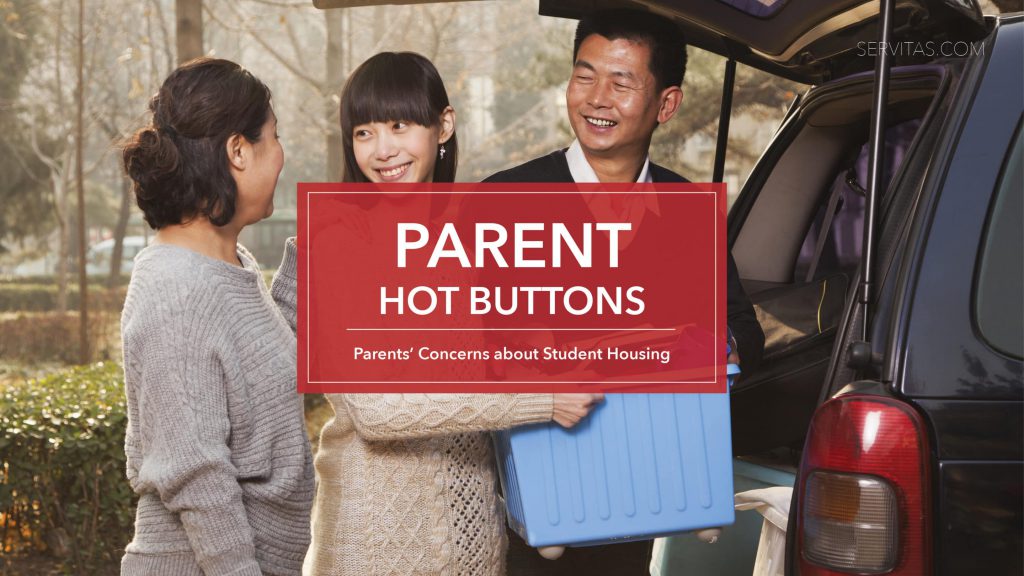When you’re part of a residence hall’s staff, a phone call from a parent can be nerve-wracking. Dozens of questions go through your mind. Has a student been hurt? Are the parents aware of something you haven’t learned about yet? Did the property’s staff fail in some way? Is there a safety concern? Is everything ok?
Building Interpersonal Skills
In contacting a resident assistant or a member of the property’s staff, parents expect you to help their student through those tough times. Parents can alert you about a problem and give you information you need to solve that problem.
Parents have entrusted us with their child’s welfare for the academic year. Chances are, they liked our property and felt comfortable letting their student stay with us at this critical part of their child’s life. We must own this decision and do everything we can to ensure we live up to their expectations.
After arriving at college, students usually learn some things quickly: the significance of regular class attendance, taking good notes, and the consequences of failing to keep up with their academic obligations. However, as the saying goes, students learn 25 percent in the classroom, but 75 percent from real-world experience. That 75 percent involves everything a student does outside the classroom. Much of that 75 percent happens in your residence hall.
Coping with roommates and neighbors who may come from very different backgrounds, however, doesn’t have the same clear-cut parameters as academics. These kinds of interpersonal interactions may involve confrontation and stepping outside of comfort zones – even for you, a residence hall staffer who’s been trained to handle such difficult situations. Despite the obvious discomfort involved in these situations, confronting difficult interpersonal issues among your residents and facilitating mediations are positive, both for you and your residents. In situations like this, we learn to stand up for ourselves, negotiate our needs and desires, and compromise.
When Parents Reach Out
When contacted by a parent, diligently note everything he or she says. Communication is key. A parent needs to know, more than anything, that you care about his or her student and the situation, and that you’ll do everything you can to facilitate a resolution. Being a good listener is a must. Let the parent talk and explain the situation. Question them only if you don’t quite understand what he or she says. Identify the issue, gain helpful information, and reassure the parent that their child will get through the issue. Ask the parent about their expectations for resolution. Finally, let it be known that you and the rest of the staff are there to help.
Because most resident or community assistants are students themselves, involving the property’s highest-ranking staffer – such as a general manager – may reassure concerned parents that someone with the experience and authority to resolve issues is available.
Once you’ve learned all you can from a concerned parent and involved, if necessary, the general manager, tell the parent what happens now. Set the expectation that the issue cannot be resolved without involving their child. If the situation involves a roommate issue, ask the parent to encourage their child to first confront the situation in a calm and diplomatic manner with their roommate. If the student needs guidance, ask them to set up a time to talk to their resident or community assistant for advice. If the situation is not resolved through the student’s own attempts, the resident or community assistant should get involved as a guide and a mediator.
Mediating and Guiding Communication
In a conflict involving two or more people, no one person is 100 percent wrong or right in any situation. This can be difficult to understand, but it’s the truth. Our job is to simply facilitate and guide communication that leads to resolution.
We need to identify the problem and not play favorites. We can also provide parents guidance they can share with their students. It’s a learning experience worth recommending.
Once steps toward resolution have been taken, follow up with the parent to keep them informed about the resolution process. Continue to monitor the situation. Through it all, show empathy and genuine concern.
Always remember that we are in a great position: facilitating communication and compromise and creating an environment in which students can, and often do, make some of the best memories of their lives.

